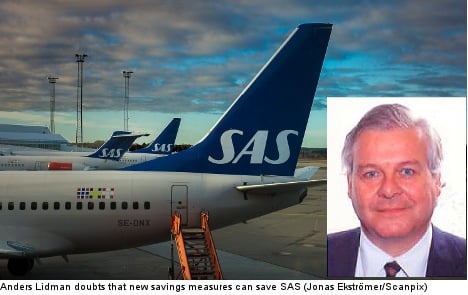“It’s too late now,” airline industry consultant Anders Lidman told The Local.
Lidman’s comments come following an announcement by SAS on Monday that the company planned to slash 3 billion kronor ($445 million) in costs through salary reductions and other measures which include shedding nearly 6,000 jobs through divestments and staff cuts.
SAS CEO Rickard Gustafson dubbed the plan SAS’s “final call” in avoiding bankruptcy.
But Lidman, who runs an aviation consultancy in western Sweden, said there was very little SAS could do to overcome a legacy of bad management and an approach to the airline business which remained stuck in the early 1980s, when national carriers enjoyed monopoly conditions.
“When you have a monopoly you don’t have to worry about costs. You can instead focus on service, and SAS was very good at that,” he said.
He explained that SAS has been exceedingly slow in responding to changing market conditions which have seen the emergence of several low-cost carriers such as EasyJet, Ryanair, and Norwegian, as well as major advances in internet booking.
“It’s sort of like being infected with a virus for a long time and not discovering you are sick until it’s too late,” said Lidman, who criticized SAS for having “no reaction” to changes that have made it harder for the airline to compete.
“It’s taken 25 years and SAS is still weighted down by the legacy of the old days,” he said.
According to Lidman, SAS made a strategic error by betting on the European market, rather than focusing on long-haul routes for which there is less competition.
“They can’t earn enough in the European market, and that is where they generate 90 percent of their income,” he said.
“They will never compete with the low-cost airlines in the bloodbath which is the European market.”
Among the many problems with the new savings plan, according to Lidman, was that it failed to address how the airline would generate new revenue.
“For every penny they save, they will end up losing two pennies in income,” said Lidman.
One of the airline’s biggest obstacles was its inability to invest in a new fleet of aircraft which have much lower operating costs than SAS’s current fleet.
“They are caught in a death grip,” said Lidman.
He also faulted CEO Gustafson as well as SAS board vice chair Jacob Wallenberg for delivering an ultimatum regarding the savings plan.
“If we don’t come to an agreement with staff, then SAS will cease to exist,” Wallenberg told the Dagens Industri daily on Monday, adding that the company only had a week to convince staff to accept the changes.
Lidman pointed out that, while SAS had enough cash to continue operations, putting a deadline on when employees and unions must agree to the measures meant the company might have to declare bankruptcy prematurely.
“If one union says no to the measures, the company must then logically declare bankruptcy,” he said, agreeing that Wallenberg had essentially “painted the airline into a corner”.
Lidman also had a simple explanation for why the Swedish state, which is SAS’s largest owner, hadn’t been able to sell its stake in the company.
“No one wants to buy it,” he said.
He said, however, that there was no shortage of other carriers that would be able to take over both SAS’s domestic and international routes should the company go bankrupt.
And while passengers may not need to worry just yet about whether or not to book travel with SAS, Lidman explained that concerns about the airline’s future may have already set off a downward spiral.
“Travellers get worried and then refrain from making reservations or paying upfront for annual membership cards and suddenly you have sort of a self-fulfilling prophesy,” he explained.
While Lidman stopped short of saying that SAS could go bankrupt by the end of the year, he remained very pessimistic about the airline’s long-term future.
“I’m very doubtful” that SAS will be around at this time next year, he said.
David Landes



 Please whitelist us to continue reading.
Please whitelist us to continue reading.
Member comments